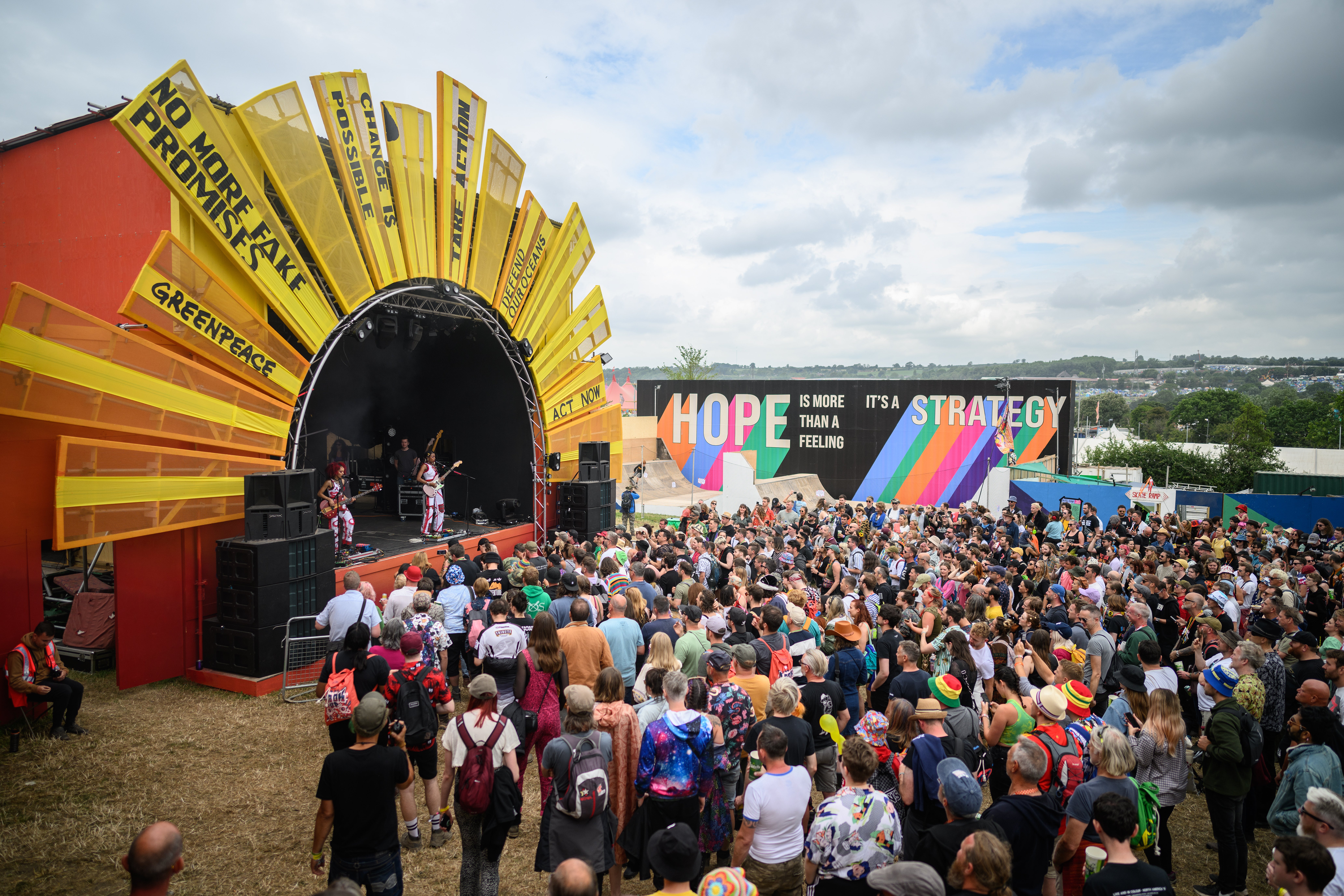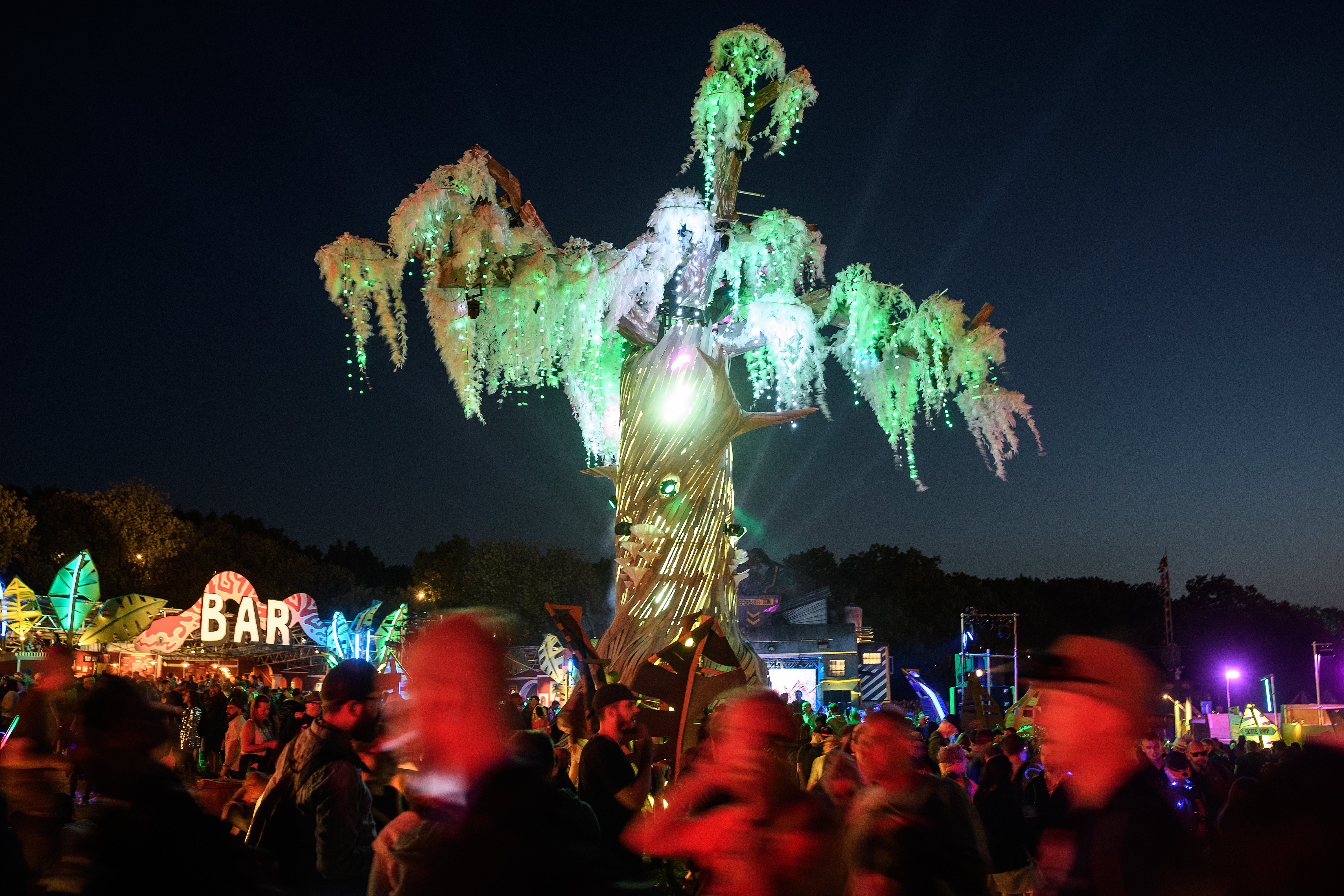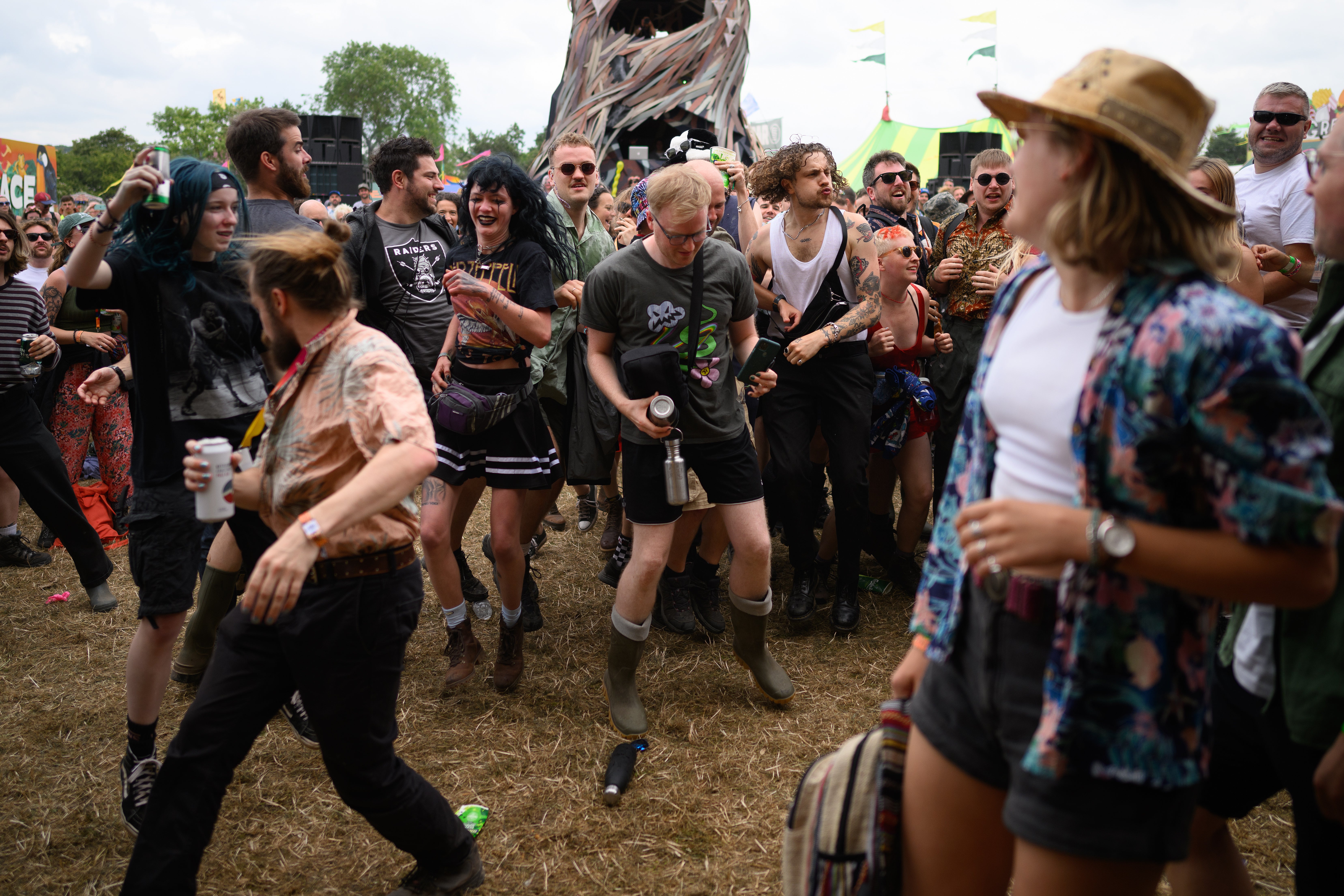Saving the world one rave at a time: how Glastonbury’s Greenpeace Field took over Worthy Farm
A DJ set from a Spice Girl, a secret set from Self Esteem, and an urgent documentary from Maggie Baird (aka Billie Eilish’s mum) – how did the Greenpeace Field become Glasto’s place to be? Mark Beaumont hangs out beneath the techno tree

Your support helps us to tell the story
From reproductive rights to climate change to Big Tech, The Independent is on the ground when the story is developing. Whether it's investigating the financials of Elon Musk's pro-Trump PAC or producing our latest documentary, 'The A Word', which shines a light on the American women fighting for reproductive rights, we know how important it is to parse out the facts from the messaging.
At such a critical moment in US history, we need reporters on the ground. Your donation allows us to keep sending journalists to speak to both sides of the story.
The Independent is trusted by Americans across the entire political spectrum. And unlike many other quality news outlets, we choose not to lock Americans out of our reporting and analysis with paywalls. We believe quality journalism should be available to everyone, paid for by those who can afford it.
Your support makes all the difference.The roots of the rave tree have stretched far out across the vale of Avalon. On the Pyramid Stage, Greta Thunberg is the guest of honour. At the Other Stage, climate change awareness films screen between acts. But the hub and heart of Glastonbury’s activist mindset remains the Greenpeace Field, where unity and awareness over the world’s most urgent threats go hand in hand with all-day party vibes.
“There’s so much anxiety about what’s coming and what’s happening in the world, it’s important to remember that we need to come together and celebrate the good things that have happened,” says Greenpeace spokesperson Pat Venditti, holed up in the field’s Bowie-soundtracked backstage bar. The rave around the field’s thirty-foot techno tree is hotting up outside – at 1pm. “That’s what we try to do with the field, to celebrate activism and celebrate movements that have created a lot of change.”
Established in 1991, the Greenpeace Field campaigns hard – and parties harder. Besides the regular attractions of the vertical slide, skate park, Sunset Lounge cocktail bar and blossom-dappled rave tree, where Mel C spins Spice Girls hits and Don Letts roams the crowd recording voices to loop into his Chant Dub Live, the stage here is becoming a go-to destination in its own right. Friday sees a He.She.They takeover and a full bill of female or non-binary acts – “to recognise the value of all the voices in the movement to have a healthy planet,” Venditti says – featuring such cutting edge names as Nova Twins, Dream Nails and Billy Nomates. Self Esteem plays a secret set on Saturday, alongside Katy J Pearson and Tim Burgess, and the odd homegrown Hollywood superstar stops by.
“My first Glastonbury was 35 years ago,” says Simon Pegg, settled backstage with Burgess, discussing their attempts to watch Wet Leg and the glory days of ’87. “I saw Taj Mahal, Crazyhead, Gaye Bikers On Acid…”
“I saw them,” Burgess grins, “and the Poppies as well.”
“Yeah, I saw the Poppies, and Dr And The Medics,” Pegg continues. “I was seventeen, I went from college. It was all lawless then, there were no police here, so for the drug dealers it was like a Saturday market. I was this seventeen-year-old kid from Gloucester and there’s all these people shouting out “hash! Weed!” They would sell their wares like they were selling apples.”
Pegg is here as an ambassador of Greenpeace, but he’s no armchair activist. He recently hit the English Channel himself on “a little rib boat” as part of the Ocean Witness mission to chase away supertrawlers dredging the ocean bed. “It’s really damaging for the marine environment,” he explains, “so we went out and we chased off a bunch of these ships, it was really exciting. We got mooned by a French fisherman, that was fun. I think it’s important to do something.”

“It’s worse than ever, isn’t it?” says Burgess. “I used to blame my parents’ generation and obviously we’re gonna be blamed by future generations.”
“My kid blames me,” Pegg jokes, but he’s well aware of the seriousness of humanity’s situation. “A thousand days, apparently, is all we have left before we reach the tipping point, and that’s a terrifying statistic. Greenpeace are at the frontline of making people understand that.”
Though the Greenpeace Field sets out to celebrate activism in all its forms, from Black Lives Matter to Roe v Wade, the climate crisis understandably dominates conversation. On Friday in Beam – the field’s striking wooden maze that opens onto an idyllic central screening area – Billie Eilish’s mum Maggie Baird arrives to introduce a screening of her new documentary Overheated. The film features Billie, Emily Eavis, Vivienne Westwood and others talking about the impending dangers of climate change and the anxiety it imposes on new generations.
Enjoy unlimited access to 100 million ad-free songs and podcasts with Amazon Music
Sign up now for a 4 month free trial (3 months for non-Prime members)
Enjoy unlimited access to 100 million ad-free songs and podcasts with Amazon Music
Sign up now for a 4 month free trial (3 months for non-Prime members)
“I think it makes it relatable for young people and something you can stick with, because you see the devastation but then you shift to people who are feeling the same way you’re feeling,” she says. “You get a little bit of each, so you don’t get too overwhelmed at any one place.”
Overheated is an offshoot of Baird’s Support + Feed campaign, which gives plant-based meals to people in need. Both emerged as the result of the Eilish family’s deep-rooted environmental concerns, which are now spearheading real change to make the music industry more plant-friendly. “The music industry has this potential to [have] major influence unlike any other art in a way,” Baird explains, “because they encounter such a large fan base and artists have very devoted fan bases. It has an opportunity to cast a very wide climate shadow and make a big impact.

“Six years ago when I started working with Billie on this, or five years ago when she started touring, I would ask about things and I always got the answer ‘well, that’s just how it’s done, the music industry is hard and it’s just how we do it’. That’s not the answer we get anymore. People are excited to tell us about the changes they’re making. At the O2 they were excited to make sure it was all vegan food in the arena, not just in our catering. They were excited to show us what they were doing with water bottles. If you look at the history books in the future and you look back, you will go ‘these people living this moment, what did they do? Did they rise to the occasion, or did they fail miserably?’ So it’s exciting to see the people who are really rising.”
Glastonbury, and the Greenpeace Field in particular, seemed “the perfect fit” for Overheated, Baird says. “That was just a no brainer: Billie is going to headline, they have a Greenpeace area, it’s a perfect connection.” Baird got her first taste of the spirit of the place when Billie played here in 2019. “There was this magic to it, because you could see people for miles it seemed, and I loved the flags because in the distance it looked like Braveheart or something.”
Is the Glastonbury mindset something everyone needs to adopt to effect change? “Absolutely. Three years ago we were here and I was very impressed at the time – wow, they don’t have plastic water bottles three years ago, that was ahead of its time, most festivals were not doing that. So they definitely have a much better mindset.”
The film focuses on individual changes we can all make, but is it governmental shifts that will really make the difference? “I think it’s really both,” Baird argues, “because grassroots change leads to corporate and governmental change. We know that governments and corporations many times are only responding to financial reward and what’s popular, so I think all the grassroots changes are crucial, but they don’t in any way let off the hook the major industries that are the major part of the problem. But as individuals make changes in their lifestyles, they create interest and markets and attention - what they want to see, what they want to hear, what they want to read about, what they want to purchase, how they want to live their lives. That ultimately will influence the larger entities but of course, we can’t forget that the larger entities, the government or corporations do need to be making the biggest changes. [But] what gives me hope is what gives a lot of people hope - at least now there is a momentum.”
On Sunday, everyman troubadour Beans On Toast lulls the Greenpeace crowd with an afternoon of “Sunday love songs”. A relaxing end to a weekend in the field that, perhaps more than any other, can lay claim to being the beating, and beat-heavy heart of Glastonbury. The field out to save the world one rave up at a time.



Join our commenting forum
Join thought-provoking conversations, follow other Independent readers and see their replies
Comments